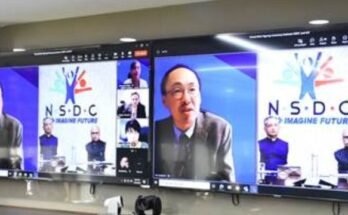The National Skill Development Corporation (NSDC) is a public private partnership under the ambit of Ministry of Skill Development and Entrepreneurship (MSDE) set up as part of the governments’ coordinated action in the skills space with the mission of skilling-reskilling-upskilling 25 million individuals by 2025. NSDC operates in this area by partnering with intermediaries – Training Partners (TPs), Recruitment Agencies (RAs), and Sector Skill Sector Councils (SSCs).
NSDC) aims to play the role of a catalyst in creating and nurturing the workforce by imparting relevant skills through a world-class skill development programme that understands the requirements across sectors and narrows the existing gap between the demand and supply of skills. Our mission is to upgrade skills to international standards through substantial improvements in standards, curriculum and quality of skilling imparted through a public-private partnership model. NSDC seeks to enhance, support and coordinate private sector initiatives for skill development, encourage industry involvement and secure funding for initiatives that will have a multiplier impact on the skilling ecosystem.
Objective
To achieve its stated vision and mission NSDC, wants to build a greater understanding of the skilling ecosystem in India, both on the demand and supply side. We wish to undertake a nationwide study of the skilling requirements across sectors and segments of the economy, skill opportunities and supply of skills through educational and vocational institutions, staffing organizations and workforce acquiring skills for employment and self-employment. The study should address the following elements:
- In-depth understanding of skill development ecosystem on the supply side to include:
- Skills imparted by educational and vocational training institutions.
- Skills acquired by different target groups within the population – stratification to be based on age, gender, level of education and level of skills (parameters defining skill levels to be developed).
- Role of staffing organizations, skills supplied by them currently and gaps envisaged by them.
- Challenges faced by target groups with different levels of skills and the opportunities they seek for employment and/or self-employment.
- Aspirations of youth.
- In-depth understanding of the types of skills demanded by different segments of the domestic economy:
- Skill requirements of the 8 core sectors
- Sectoral skill requirements – agriculture and allied, MSMEs, large manufacturers and service providers.
- Formal and informal sectors including gig ecosystem and skills demanded therein.
- Nature and extent of gaps between demand and supply of skills – disaggregated for different segments of the economy and different target groups in the population.
- The policy, regulatory and programmatic interventions needed to narrow the existing gap and improve the overall skilling ecosystem.
Scope of Work
- Geographical coverage: The study to be undertaken will be pan India covering five regions – North, East, West, South and North-East covering both rural and urban areas.
- Target segment:
- Supply Side: Students – 9th to 12th standard, polytechnic, engineering, research, vocational (ITI & JSS) background from formal informal coaching etc. Workforce – blue collar, white collar etc. Skill Providers, Staffing Organizations
- Demand Side: Large, MSMEs & Unorganized Sectors across key industries. Industries from various categories
| Aerospace & Aviation | Gem & Jewelers | Media & Entertainment |
| Agriculture (FPOs to be covered) | Handicrafts & Carpets | Power Sector |
| Apparel Made-Ups & Home Furnishing | Healthcare (CARE Economy) | Retailer |
| Automotive | Hydrocarbon | Rubber, Chemical & Petrochemical |
| Beauty & Wellness | Iron & Steel | Green Jobs (ESG & Climate) |
| BFSI | Infrastructure Equipment | Mining |
| Capital Goods | Instrument Automation Surveillance & Communication | Person with Disability |
| Construction | IT -ITeS | Sports, Physical Educations, Fitness & Leisure |
| Domestic Workers | Leather | Telecom |
| Electronics | Life Sciences | Textile |
| Food | Logistics | Tourism & Hospitality |
| Furniture & Fittings | Management & Entrepreneur | Water Management & Plumbing |
- Sampling Methodology:
The Pan India study is expected to cover the five regions of the country – North, East, West, South and North-East, through a stratified sampling plan capturing different dimensions of the skilling ecosystem
Duration: 45 days from signing of the contract
Last Date for Submission: 02 January 2024; 04:00 PM IST



